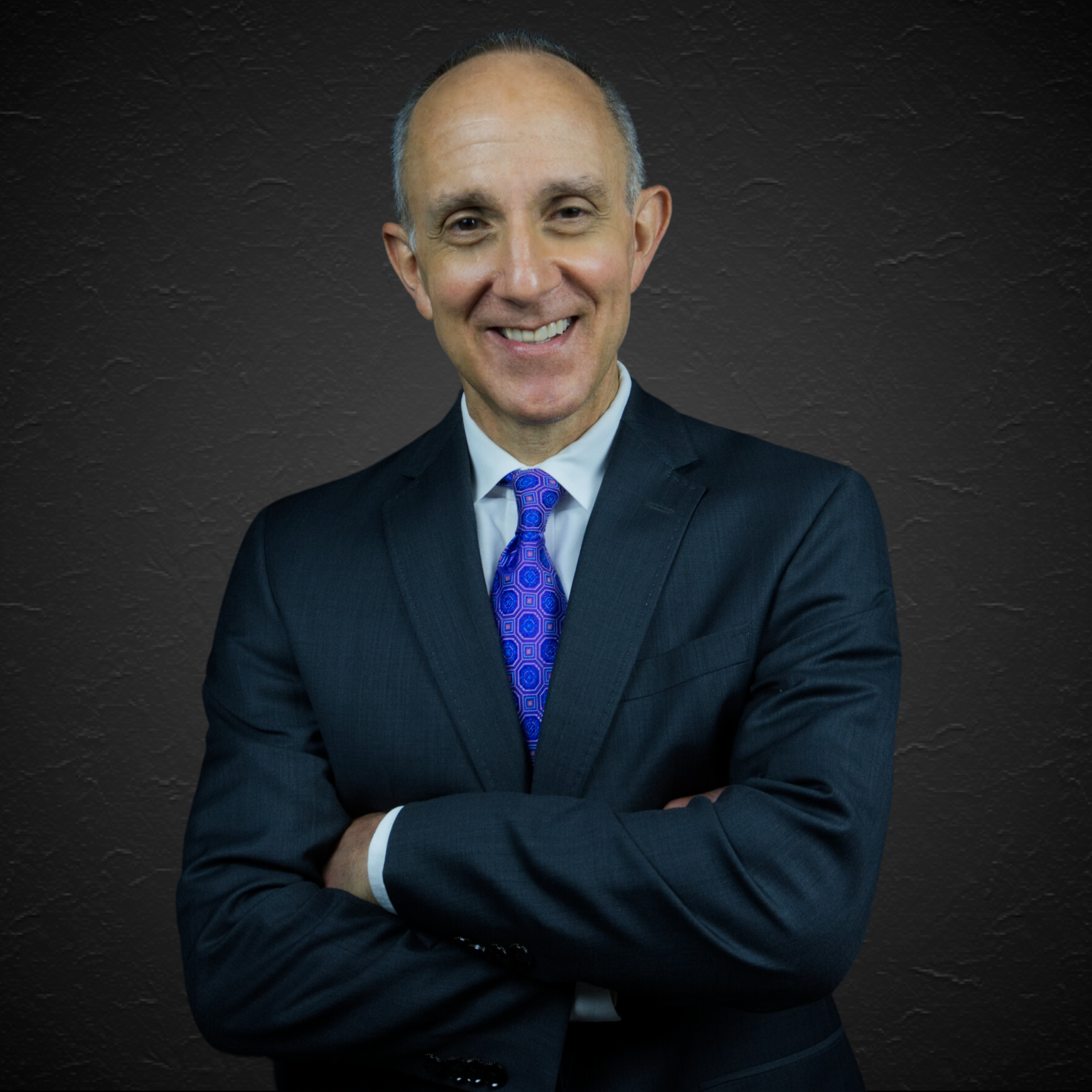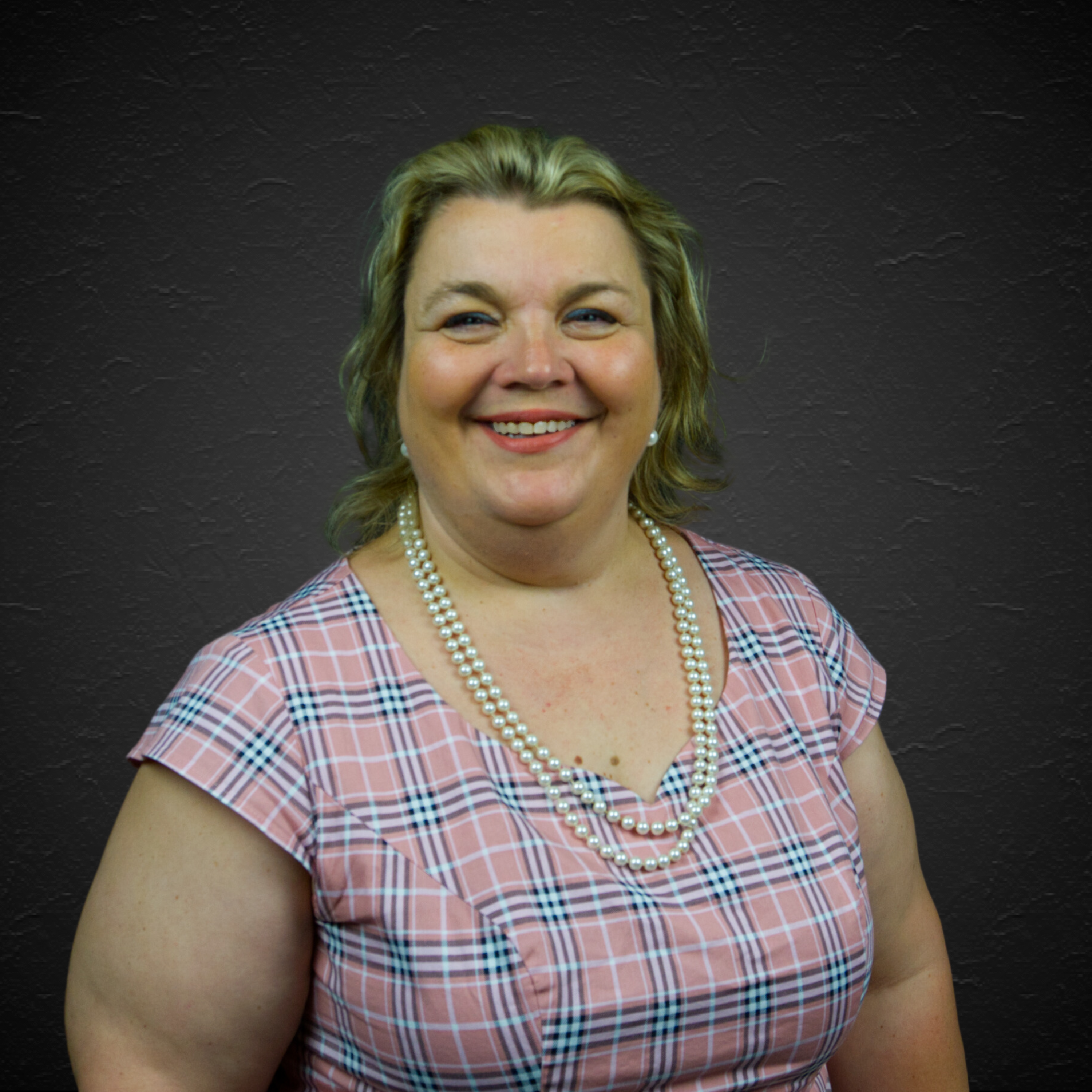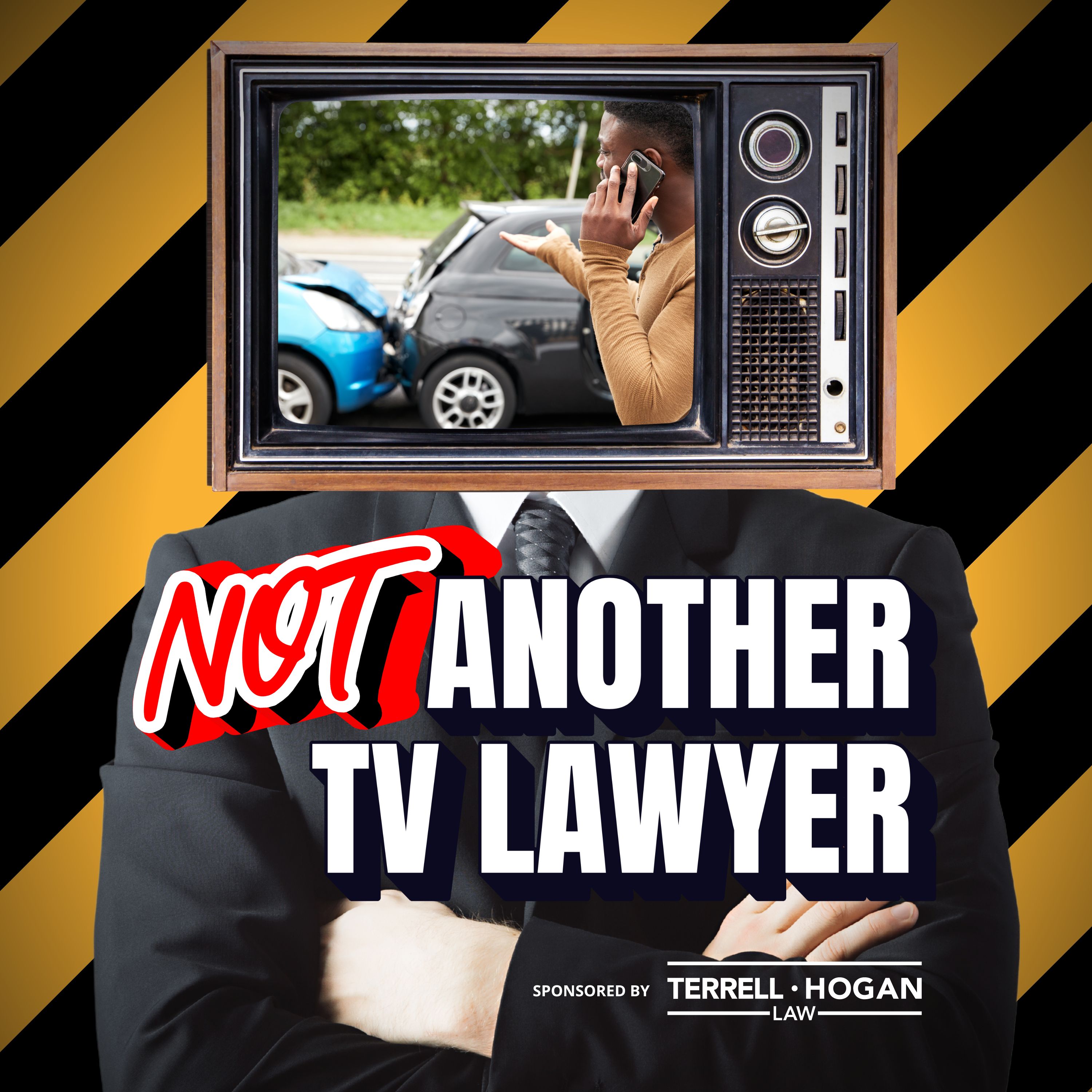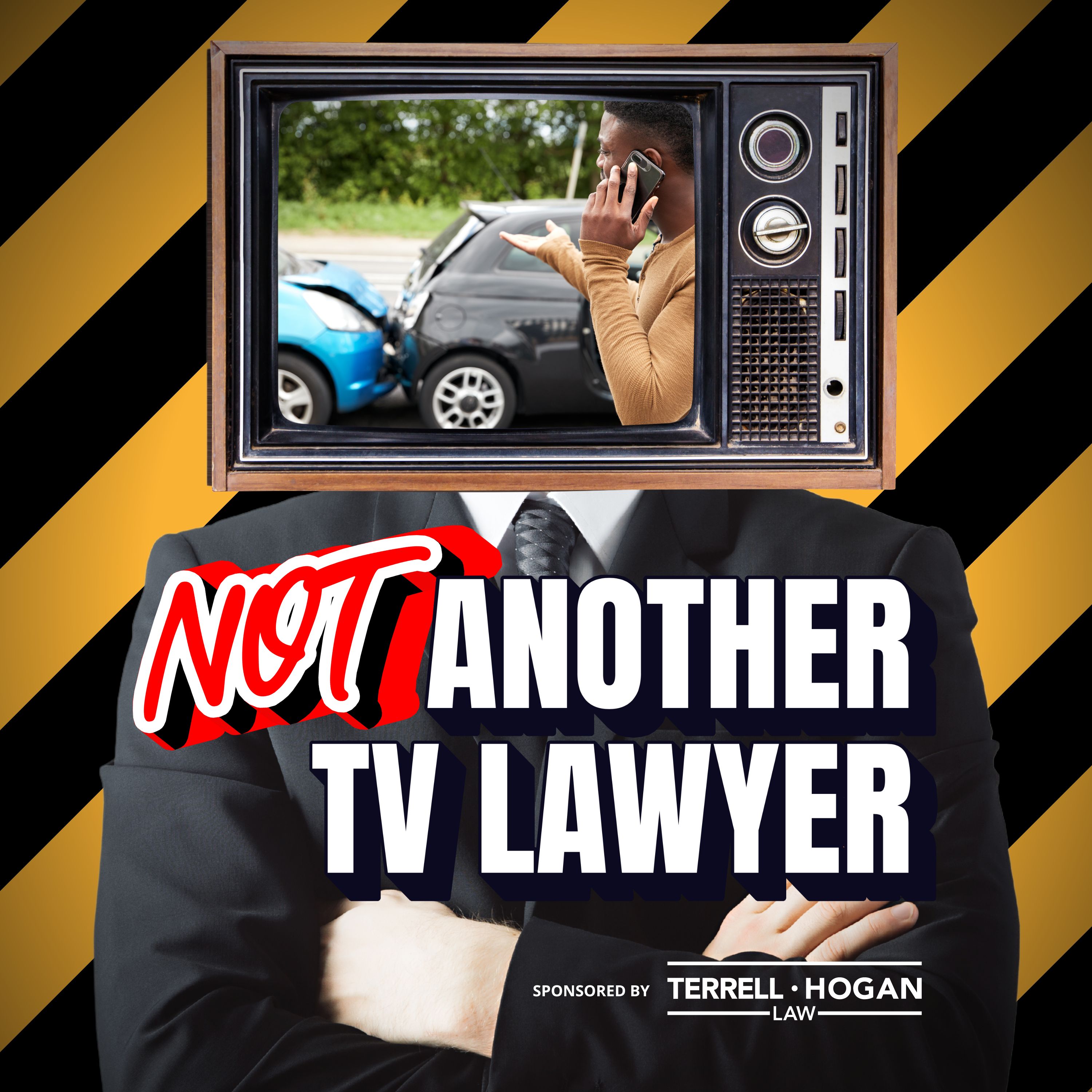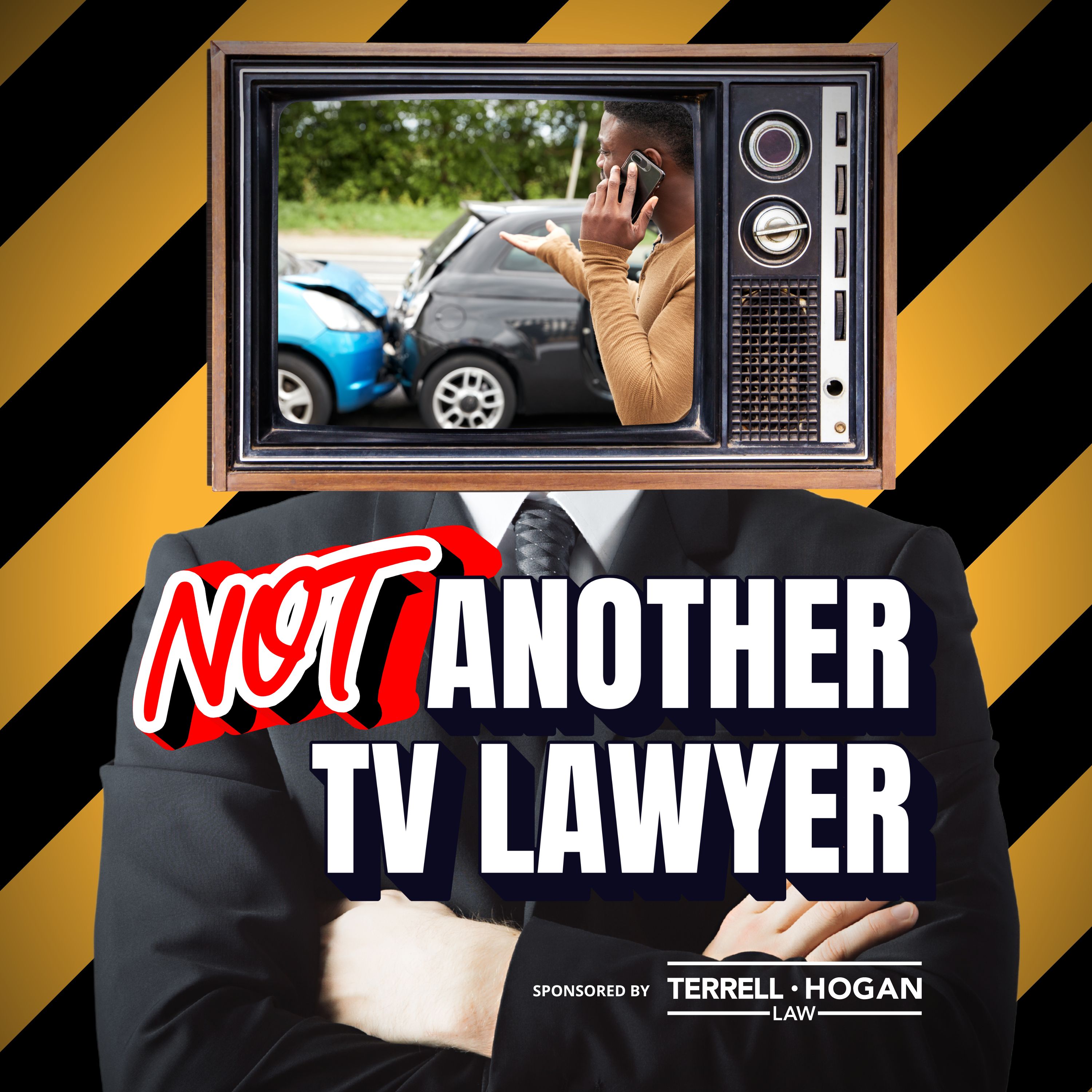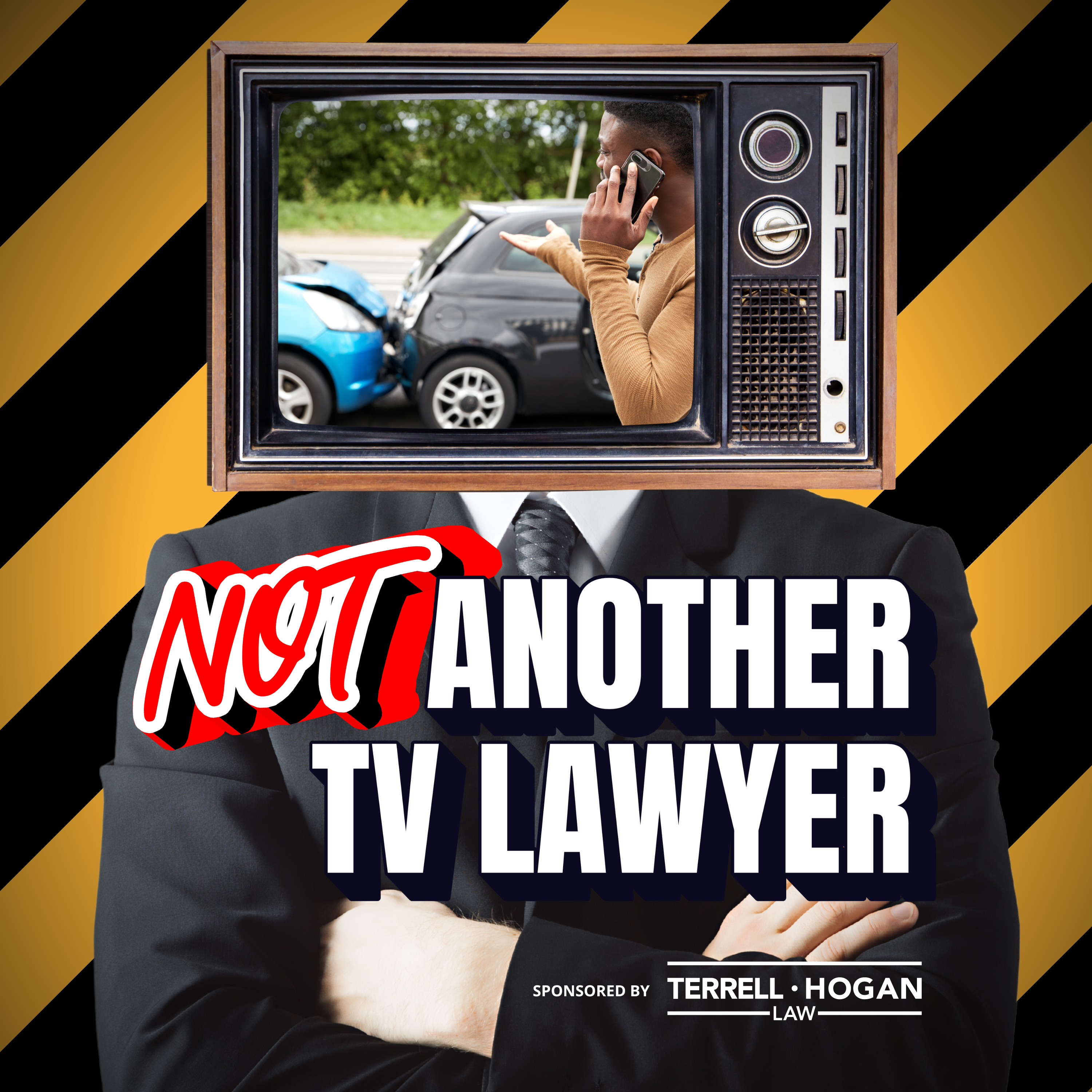Episode Transcript
Welcome to Not Another TV Lawyer. I'm Chris Shakib. I'm Jessica Hall. And this is a podcast sponsored by the law firm, Terrell Hogan, that's been in Jacksonville for greater than 50 years. And we are very passionate about helping people and personalizing our service to help them get the service they deserve.
Welcome back to Not Another TV Lawyer. Uh, today's episode, we are having as a guest Phil Scheets, who is a doctor of chiropractic with Duval Spine and Rehab. Phil, we really appreciate you coming today. Thanks for having me. And we wanted to talk about chiropractic care, uh, particularly in the context of folks who've been injured in motor vehicle accidents.
People who are hurt in auto accidents. And how chiropractic care can fit in to that in particular. Um, could you, uh, tell me what, tell me a little bit about your educational background. Well, I received a bachelor's in biology with a minor in chemistry. , very interested in the sciences and medicine at the time.
When I, when I was in school, I discovered that I didn't really like the sight of blood. It's all too many of those while I was playing football in college. So went into, what I, a passion of mine, which was teaching at the time. And I was teaching, I was, coaching high school baseball up in New Jersey where I lived and I got, I was working nights, , in a warehouse loading trucks and I got injured in a forklift accident and I, I resisted going to a chiropractor at first because I, you know, I was definitely one of those people who did not want to go to a chiropractor, Um, I went the whole medical route and, um, I made, you know, I got a little bit better, but I was still in a lot of pain, constant injury, and I finally decided to go to a chiropractor.
So, Uh, when I went to the chiropractor, I was like, this is amazing. It took me eight months to go after my injury. But when I went, uh, man, my life was changed forever. And, at the time I was going to apply for a master's, um, in education. And my chiropractor said, why don't you go to chiropractic school?
So I applied for chiropractic school, got into a life university in Marietta, Georgia, went there, um, spent four and a half years studying chiropractic and, um, it's been, uh, it's been a journey ever since. And where's your office now? Duval Spine Rehab is located, on R. G. Skinner Parkway, , right at the 295 Bay Meadows area.
What is chiropractic particularly in, um, In comparison to say medical care, how does it differ? What, how is it similar? Well, it's similar in that it takes a lot of years of schooling to, to get licensed to, to, to get your degree in chiropractic. I mean, we are considered doctors of chiropractic, different than doctors of medicine where we don't prescribe medication.
Um, so instead of spending a lot of time in school on pharmacology, we're learning more about the structures of the body, particularly the spine and the central nervous system and how they relate to each other. Why is chiropractic particularly relevant to folks who've been involved in auto accidents?
Well, when somebody is a victim in an accident, they almost always have spinal injuries, whether it's whiplash injury to the neck, it can also be to the lower back, it can be any place on your spine. or, uh, related structures as far as your extremities go. And since chiropractors are experts in the function of the spine, it's, it really should be your first choice when you've been in a motor vehicle accident.
Um, once, once you, uh, realize that there aren't any, um, severe injuries like fractures or dislocations. Um, but even if you went to see a chiropractor and we were suspicious of that, we would send you out for some diagnostic testing. So x rays or MRIs, things like that. Correct. Correct. Yes. Okay. So if somebody has been in a wreck and they come to your practice, what kind of treatment can they expect?
Or cause, cause sometimes I know for me personally, the idea of going to a chiropractor seems a little scary. So what could they expect if they go to your practice? Sure. Uh, yeah. And that's a good point. Cause a lot of times, I mean, I myself was like, you know, I can't say I was scared of a chiropractor, but I was like, ah, they're quacks.
I don't want to go see a chiropractor. I remember my grandfather, uh, Uh,
That's what he called chiropractors, and that's all I knew about what chiropractors were. Sure. Yeah. And that's, you know, that's one aspect that, you know, I guess a lot of the YouTube videos nowadays and everything with the, the crack videos. I'm guilty of doing one myself, but, um, they do get a lot of attention, but people also think that we're just backcrackers and that's all we do.
But, honestly, with all the education, we can perform a comprehensive evaluation that, that includes a physical examination, orthopedic, we're able to rule out or at least refer out, if we're suspicious of, of something that's beyond our scope of practice. But when a patient comes into me after a car accident, or any kind of injury of that sort, you know, I'll do a full examination on them.
That starts with their paperwork and the consultation to see the history of the accident, how it occurred and, and what types of injuries I might be suspicious of as well as their medical history, if there's some contraindications. To going forward with chiropractic care, after the examination, most of the time when somebody is in a car accident, I'll send them for some type of diagnostic testing, whether it's x rays or M.
R. I. S. Sometimes we can, we can, we'll almost always get an x ray in the beginning. Sometimes we can wait on the MRI to see the extent of the injuries or if the patient improves and maybe it's not medically necessary. But, if there's neurological deficits, that we discover on the examination, we may have to refer for an MRI right away.
Or if we suspect disc injuries, after the examination. I, I do like to treat patients on day one, offer them some comfort. The treatments start out very gentle. Most of the time there's no cracking in the very beginning. Um, we have, I have various therapies at my office, including.
Hot packs, cold packs, electric muscle stimulation. I even have an instrument that's called an Arthur stem, which is an adjusting instrument. That's almost like a little. It sounds like a woodpecker, but it's almost like a little jackhammer. So when we first started out, we can. Actually apply that to the patient instead of going in there and just cracking a patient from day one, right?
Well, you know, I've represented like probably thousands of people who've been in auto accidents over A longer amount of time than I'd like to admit. And, uh, you know, I, I've had a lot of clients who went to chiropractors and one of the things they talk about is they really do feel better after that.
What, how, how do you, how does chiropractic care do that? Uh, do, do you use any kind of medicines, any kind of, uh, anything like that? Or what, how is it you do it? We don't use, medicines. We're, we're not licensed to prescribe medications. , we can use some topical type, medicines if they're warranted.
I don't do too much of that myself, but there are chiropractors who do. I always like to explain it that, when you've been injured, uh, you have a lot of bad information going into the brain. They call it nociception, which is the sense of pain and destruction, tissue damage. And that interferes good neuronal impulses.
What we're doing with chiropractic is we're overriding that pathway. by putting in some motion, we're activating the mechanoreceptive, which is the sense of movement and proprioception, which is the sense of position. And those neurotransmitters override that nociceptive pathway.
And it kind of gives the brain a little bit of a reset so that the brain and the body are communicating again, , properly. And that That feels good because it kind of, um, Cause you're not so overwhelmed with the pain and all the other symptoms that, the triggers that you were talking about. Yeah, exactly.
And, and, and that gives the body a rest and allows the healing to take place. Okay. And, What about surgery? Do chiropractors do any types of surgeries? Nope, we're not surgeons. We don't do any cutting. We don't do any, no prescribing, no cutting. We refer out for those sorts of things if they become necessary.
All right. So, chiropractic is something, if you're not too keen on the idea of getting cut, Cut on in a surgery, uh, or you don't want to have to take, um, pain medications or not heavily take pain medications. Chiropractic care is a, is a good alternative. It's really a great alternative. And I, and I think there's been a, a big push in, in the past uh, 10 years to kind of avoid the, types of medications that really cause issues with people.
be it addiction, um, and whatnot, uh, whereas chiropractic can be a good alternative in a drugless approach to caring for a patient that's in pain. Right. I mean, it's a big deal nowadays and we know about it. There's the opioid epidemic and I've seen, I've seen a number of clients who, because of an injury, because of pain medications, particularly opioids that were prescribed.
They become addicted to their pain meds, they become addicted and then they have this. decline. Uh, what I've heard said is nobody's ever, nobody's ever been addicted to chiropractic care. What you get, uh, won't do anything like that. And that's always, always how I've seen. Why there's a benefit to clients in trying to avoid, if they can, uh, you know, getting opioids or pain medications.
Um, uh, can anybody become addicted to chiropractic care? It's funny that you say that Chris, because, um, that's one of the fears of some patients is that they will become addicted to chiropractic care. That once you have chiropractic care, you always have to have it. But. It's not addictive in the sense that, you know, you're, you're not going to overdose on chiropractic care.
You're, you know, you're not going to become dependent on it, but when you start getting adjusted, you feel so much better. It's, it's, I would make it akin to somebody who's addicted to going to the gym. Like you feel really good getting that pump or, you know, feeling good from that when you get chiropractic care, when you, when you receive that, um, good brain body communication and the healing that takes place, it's something that you, you know, would want to incorporate into your life long term, but not out of addiction, but out of, out of health because it makes you feel better.
It does. Does chiropractic is different from medical care and it's not surgery. Does, uh, Does insurance cover chiropractic care? Most insurance companies cover chiropractic care. We were talking about auto accidents. Oh, yes. The first type of insurance we deal with in auto accidents would be personal injury protection, PIP.
Does PIP cover chiropractic care? Yes, it does. And, uh, is that something that, you know, your patients very often will be treating, uh, under that that's what's covering their. Yes. Yeah. That's their primary payer. Their, their personal injury protection benefits pay for chiropractic care. Okay. Now, PIP has a limit, uh, you know, you're, you've got up to 10, 000 in coverage.
If they get treatment within the first 14 days. But you have to first be considered an emergency medical condition and if you don't get treatment and, uh, you know, uh, I guess some kind of affirmation from a doctor that there's an emergency medical condition, then there's a limit to how much PIP they can get.
Are chiropractors able to do that? Provide care as long as they get that? You have someone that can designate that a patient has an emergency medical condition, as I think is where he was going with that, right? She read my mind. Yes. She's good at that. It's her job. Yes, actually. My business partner, Elizabeth Began is an advanced nurse practitioner and, she can actually provide the EMCs if they're, , necessary.
To the patients. , I also, there, there are various , doctors in the area as well that I can refer to for that evaluation, um, for the emergency medical condition. So, okay, now, you know, let's say the, you've done that and, uh, you can get the full 10, 000 of PIP coverage, but it's a, it's a condition that requires more care than just the 10, 000.
Do health insurance companies, cover chiropractic care? Well, we will, , if the patient has, health insurance, we'll have that as a secondary payer, once the PIP benefits are exhausted. Yes. Is your office, , set up to be able to effectively bill auto insurance and health insurance and make sure that the clients aren't, aren't out of pocket for the whole amount of the care?
Yeah, absolutely. I, I actually have a billing company that's out. , it's, it's related to my, um,, electronic health records. So when I complete a note on a patient, it automatically goes to the billing company, which is out of house and they submit the bills on our behalf. Is there anything people should know that they need to do if they're planning on coming to visit your office for the first time?
Uh, is there anything that, you know, you would want them to know or want them to bring or? Well, I have, I'm set up electronically. When a patient, um, you know, of course, one of the most important things is make sure you get someplace within the first 14 days after an accident. Um, but When you, um, contact my office, , my office will actually send you an email with a link to a patient portal so you can complete your intake before your first visit.
So I've had an opportunity to review that before the patient even gets to the office. Um, and in there is a full medical history. If you've had any diagnostic testing, we would like to have those reports at least. So like MRIs or x rays? Yeah, MRIs, x rays, yeah, for sure. We'd like to have the reports. Um, if it's, if it's one of the companies that I have portal access, I can actually get in there and look at the, uh, the images and, and evaluate them myself along with the reports.
Do you work with medical doctors too? Is that you'll talk to them, consult with them and try to work in tandem with them? Yes, I have a relationship. I have relationships with a lot of medical providers in the area. Um, depending on what the patient's needs are, whether it's, uh, neurological evaluations, pain management evaluations, orthopedic evaluations, um, so we can refer to all those, um, professionals when necessary.
So if someone is coming to your office, you're not going to just try to keep them in your office and not let them go anywhere else? No, it's, it, it's in the patient's best interest to, to have a, a lot of different, approaches, and opinions when it comes to injuries. Now, I've seen offices, uh, chiropractic offices that have, it looks like they have massage and different other things like that.
Is that part of the care that chiropractors very often will provide patients? Now massage is kind of a dirty word in the, in the PIP industry because it's not covered by, but we, we have therapists that can perform myofascial release or neuromuscular therapy. It's the focus and the intent of the therapy that's being performed.
Um, but yes, that can be, that can be a good, um, addition to just the chiropractic care. So massage is not well liked by PIP, , nowadays, but, , the term massage and the code for massage itself is not a reimbursable. Um, but you can have somebody who's a licensed massage therapist perform, various therapies like therapeutic activities or neuromuscular trigger point release trigger point release and neuromuscular, , therapies that are covered, uh, under the PIP benefits.
Okay. Now, in the context of, uh, an auto accident, say a client that we send you, gets treatment from you and the case is coming. to a point where we, we want to make a demand to the at fault driver's insurance company. Um, are, are you able to do a report that talks about your care for that particular patient?
Yeah, absolutely. I, even though I have like electronic health records, I always do initial narratives, um, periodically throughout the treatment. When we do reevaluations, I'll do a narrative and then we can always do a final narrative as well. That kind of summarizes the case. And. The extent of the injuries, whether they're permanent in nature and what that means.
Raz, you've said that the nature of the injuries, whether they are permanent, Uh, are you able to assign permanency ratings, you know, under the, I think, what is it, the AMA guides to the evaluation of permanent impairment? Yes. Um, and, and depending on the attorneys, some attorneys like a permanency rating percentage assigned, others.
Uh, like to leave it more open, we're concerned with the fact that number one, the injuries are related to the motor vehicle accident in question. And also whether the injuries are permanent in nature. Under Florida law, uh, in an auto accident case, the law is that if you do not have a permanent injury or death.
then you're not allowed to get anything other than medical bills and lost wages. And so for folks like me who handle auto accident cases, uh, the permanency is, is a important thing because, uh, if you don't have a permanency, then it, we can't get non economic damages, pain, suffering, inconvenience, mental anguish, loss of enjoyment of life, those types of things aren't available.
And so that's one of the first big questions. But the actual number for the rating, uh,, for the purposes of making a claim on behalf of my client or being in a lawsuit, , and trying a case in front of a jury, the number is not as meaningful, for us. But I know in work related accidents, , the number can be important.
Do chiropractors treat people? We're involved in work related accidents ever. We certainly can, , but my understanding is that chiropractors aren't on the workman's compensation panels in the state of Florida. Yes. So we wouldn't get direct referrals from workman's comp, but I've had patients that have sought me out with injuries who wanted an alternative approach.
Right. Because I, you know, I've, I've represented a lot of people who had work related auto accidents. Uh, and. You know, we'll, we'll send them to a chiropractor like yourself under P. I. P. Uh, but they can't go through their workers compensation carrier and it becomes. complicated, but they, they like what they're doing under PIP more than the minimal care they're getting under the workers compensation coverage, which is sad, but, uh, that, that seems to be what's, what happens a lot of the time.
Yeah, it's, it's unfortunate that, , I had the same situation when I was in New Jersey where chiropractors weren't on the panels there either, but I was, I was able to treat a lot of patients there. If I, if I, Prospective patient contacts your office, roughly how fast is the turnaround, turnaround time for them to be able to be seen and treated?
Well, I am open seven days a week, so, um, if I can get them in on the same day, then we'll get them in the same day. But, normally, within 24 hours for sure. Okay. And is that important for someone who's been an injured in an auto accident that they get somewhere soon? Yeah, it's, it's very important. Not, not just because of the 14 day rule, but the sooner that we can kind of, uh, halt the damage process and get the healing process going, the better for the patients long term.
And are you, in a way, uh, I've always told clients that chiropractors can also sort of be like, uh, traffic cops, uh, you know, early on in the case and direct where they traffic needs to flow. I mean, a chiropractor can say, all right, you need to get to, uh, an orthopedic surgeon, or you need to get to a neurosurgery, uh, or neurologist or neurologist, they, they can, you know, You know, if there's something that goes beyond what chiropractic can do, they can send the patient to those, you know, to those other places.
Is that a fair description of how you see your position as a chiropractor? Yeah, I like the traffic cop analysis. That's a pretty good one. We are, we are considered portals of entry into the healthcare system so that a patient can come to us directly, right. Um, where they don't need a referral to come see us.
Um, and, and, you know, in my opinion, having gone through it as a patient and now been a chiropractor for, uh, coming up just on about 25 years now, um, I feel like people should start with the chiropractor and then, uh, you know, that's the least invasive and then as they're, you know, if it becomes evident that they need more care beyond the chiropractor, uh, we can certainly refer them out.
Because again, nobody ever had an overdose from chiropractic care. Not to, not to my knowledge. Jessica has had some injuries in the past herself. Um, what do you do with the patient who's had prior injuries that were surgical? Can you still see patients who have had prior surgeries in the past? Yeah, absolutely.
Um, I've seen a lot of patients that have, I mean, even spinal fusions, um, different techniques would be used for them. I mean, I mean, that kind of patient wouldn't be like the racked and cracked, you know, where you're just like throwing them on the table and cracking everything. That's always for me personally.
That's always been my fear is because I'm like, Oh no, uh, but, um, because of the medical issues that I've had, I've always been really, really concerned about that, which is why I've never gone. I think. I think maybe a lot of people feel that way. Maybe they've had prior injuries or prior surgeries, and maybe they're afraid to go.
So that would be good to know that they can come to you and you can still be able to help them. Yeah, they they certainly have to let me know that they've had, you know, prior injuries or infusions or, you know, that would be discovered under examination, I'm sure. But that's why we like to get a good history and consultation on the patient before we start any treatment.
And I'm guessing that part of what you do for a new patient is even if they've had a prior history order records, uh, you know, from that prior injury, if they've had one. Yeah, for sure. Okay. has come to the accident scene, they've taken the information down, they've started the process of writing up the report, the car is being towed away, the patient, or the plaintiff, the injured person, wasn't transported by rescue that they didn't think it was necessary, and, it, spouse picks that person up and is taken home.
What should they do next? What, what is the most important from your perspective as a chiropractor that that person who's been hurt in an accident does next? I think it's very important for them to be evaluated, um, the next day or as soon as possible. Alright, so that goes back to what you're talking about as to how soon they should try to come in.
Is there anything that you need to know, uh, when they come in? The more information the better. Um, obviously a driver's license to prove that they are who they say they are is number one. If they have their auto insurance card or at least their, their insurance company and claim number, , if they've been anyplace else or have had any prior, medicals, those would be good to have.
But, , we can obtain those. We don't necessarily have to have them from day one. , if they do have an accident report, , it's, it's kind of good to visualize how the injuries took place. , but again, not completely necessary on day one, but as long as they have their driver's license and their insurance information on day one, we can, we can get started with care.
And one of the ways that we help our clients from behind the scenes is if our client, for example, say our client wants to go to your office, then I provide you as much information as I have to help them get in there faster so that you have the insurance information, you have the police report. So a lot of times when clients sign up with us and they decide to.
She's a provider for their medical care. We help them behind the scenes as much as possible to eliminate any additional stress for them so that they don't have to worry about giving their doctor or their medical provider any of this information. We do a lot of that behind the scenes. So we try to help them with that as much as possible.
Jessica is, uh, who I rely on in our office too. Maintain the communication with, uh, any office, any treater that's providing care to our clients. And, um, you know, I, over the years I've had different people working with me, but, uh, just I've had good experiences with. Good communication. I've had bad experiences with bad communication.
Um, what, what can we do as the law firm to help you do your job? Uh, what's the, what can, what do you need from us? Well, uh, Jessica is amazing at, uh, getting information. So, all right, I want to stop and say, I don't want you telling everybody. Everybody needs Jessica. Cause she only works for me. She's not working for anybody else.
So, uh, what do you want someone like Jessica to be prepared to, what do you need from someone like that? Definitely if they have medical records that they can provide the office, um, that, that's very helpful and, and any information, um, as far as, uh, any relevance to the treatment. Phil, we appreciate you being here on, uh, this is our second episode of, uh, our podcast, not another TV lawyer.
And, uh, you know, I, I can't imagine having, there's anybody I would rather have had as our second guest, uh, on our podcast. We hope to have you again sometime in the future. Thanks so much for having me. And if somebody wants to contact you in, in initiate care, who, where do they need to contact or where would they go?
Oh, they can go right to my website, www. duvallspine. com. Um, and you can even schedule your own appointment. Okay. So they can schedule their appointment online and, and, uh, they'll get an email link for their portal access and you can get everything started right away. Yes. Okay. Excellent.
Thanks again for listening to Not Another TV Lawyer. We hope that you will tune in to the next episode. Not Another TV Lawyer is sponsored by my law firm, Terrell Hogan Law. Terrell Hogan represents people in a lot of different areas of injury type law, as well as business claims throughout the state of Florida.
We represent people in auto accidents, trip and falls, people who have been exposed to asbestos and developed conditions related to that. Victims of medical negligence, victims of defective products, including medical devices and pharmaceuticals. Please feel free to look us up at www. terrelhogan. com. We look forward to hearing and being with you soon.
